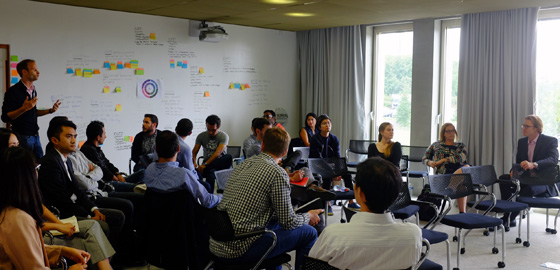Entrepreneurship Teams Wow Business Pros and Peers
The HEC Paris MBA Entrepreneurship Specialization program came to a climax in December as eight teams pitched their business projects to business professionals, CEOs and potential Venture Capitalists. Program founder Michel Safars chose the intriguing theme “Will you find the next big idea?” The teams had seven minutes to convince both the pros and peers assembled at HEC’s Bellon amphitheater that they did. The event was both taut and entertaining as the students engaged in proposals to sell products as diverse as state-of-the-art microscopes, a camera offering cardiologists the missing map of the heart, a keychain to safeguard all our passwords on internet, and algorithms which fingerprint online music. HEC Paris Communications followed these engaging jousts by graduates with lightbulb ideas they hope will light up our future.

Teaching by Doing
It has been five years since Michel Safars and HEC associate dean Bernard Garrette set about redesigning the MBA degree and its groundbreaking eLab. This combines practical and fundamental entrepreneurial skills to, in the words of its founder, “avoid the traps and discover the path”. The elusive hunt for this Holy Grail is littered with would-be innovators who, according to the MBA Only blog, often “fall short because of a logistical failure on the entrepreneur’s part, presentation problems or lack of business foresight.” Safars’ MBA Program seeks to overcome these shortcomings. Set in the heart of the Innovation Cluster at the University Paris Saclay, it arms the students to become “true pioneers”in this field. In this quest, Safars has been partnered by Pierre Gohar, the Director of Innovation and Industrial Partnerships at Saclay. After 12 months of an intensive core course, Safars and his team propose Entrepreneurship, one of five specializations that MBA students can choose from (the others being Marketing, Strategy, Finance and Leadership).
In June 2016, following a day of team-building exercises, the students divided themselves into teams of two or three. They then plunged into a four-month collaboration with external researchers, CEOs, investors, business accelerators and coaches. The aim was to create a business plan for leading laboratories which hope to transform their research into marketable products, capable of seducing the most hard-nosed investors. “This is a once-in-a-lifetime opportunity,” insisted Andrea Masini, Associate Professor in charge of the MBA program. Masini then warned the audience not to share photos on social networks “since some of the projects have yet to be patented.”
The specialist in technological innovation opened the three-hour event in which the teams distilled their months of work into a seven-minute pitch designed to seduce potential investors in the amphitheater.The 80-strong audience was also invited to participate as jury, providing a lively backdrop to the exchanges. Safars had called on his students to be resilient and take risks. “This is teaching by doing,” he explained, “adding layers of experience to the fundamentals you acquired the previous 12 months.There are real investors in this amphitheater looking for an idea based on a disruptive technological advantage. You need courage, passion, leadership,vision, curiosity, energy, resilience, and so many more qualities.”
Exhaustive Exchanges
All teams mixed power-point illustrations with well-rehearsed pitches on projects aimed at translating laboratory research into business plans. Each one of the eight teams had been designated a coach, volunteer professionals with decades of experience in the digital, start-up, business or scientific fields. “Our coach had a key role in translating the technology into a business plan,” confided Veronica Tisera in reference to seasoned manager Daniel Francou. Her three-person team had created Nanoloc, a business company offering a microscope of remarkable precision and resolution. "The microscopy business plan is the fruit of exhaustive exchanges with CNRS researchers and our joint effort could well seduce pharmaceutical companies and scientific laboratories worldwide. Using this microscope is like putting on glasses for the first time,” the Venezuelan graduate told the audience. “With resolution improving tenfold, we have projected sales of 38 million euros in the coming ten years.”
The team behind Yep won the popular vote with its algorithm tracking music technology and payment automation. “This algorithm tracks the DNA of all music composers whose work is put online,” insisted Xioalan Yin whose work in advertising, brand promotion and media shone through her presentation. “We’ll start in France where there is a 400 million euro market and move on to China,” added fellow-Yep manager Pierre Bortnowski. The Belgian, who in real life is a Romania-based architect, later shared with us some of the density of the preparatory work:“We met at least 30 different actors in this field, including the copyright collecting organism SACEM. On top of that, our coach (vice-president of Univadis International) Fabrice Valay provided the necessary focus and raw feedback we needed. We’re very satisfied with the outcome.” Bornowski now returns to his activities in Bucharest on sustainable housing but takes back rich memories: ‘It’s been a fantastic adventure, we’re going to hand over all our work to the two engineers from Paris-Tech who worked on this online system. We hope they can use it to create a start-up and, perhaps Xioalan will remain involved. Did you know," Bornowski continued, "that, in total, 85% of royalties online are not being collected? The composers deserve better and we hope that, through the idea of Fair Play Fair Pay, we can convince countries everywhere to back this project.”
“Something great is happening here,” declared innovation consultant and HEC alumni François Doux. Now it remains to be seen if Michel Safars' concluding question will be answered: “Will the (students’) projects transform themselves into real companies?”